Analyzing Citizen Perception of Law Enforcement via Relational Power
VerifiedAdded on 2023/04/21
|5
|1051
|397
Essay
AI Summary
This essay delves into the relational theory of power, emphasizing its focus on the dynamics within relationships and resource control rather than brute force. It examines how this theory relates to citizens' perceptions of law enforcement, shaped by personal experiences and media portrayals. The essay discusses the designative power held by law enforcement officers and how societal perceptions, influenced by events like police actions against unarmed individuals and movements like #BlackLivesMatter, affect trust and conflict. It highlights the difficulties in resolving disputes when power imbalances exist and suggests strategies such as community policing, increased communication, diversity initiatives, and corruption checks to improve relations between law enforcement and the community, ultimately aiming to shift the societal view of officers from 'predators' to 'protectors' through positive engagement and mediation.
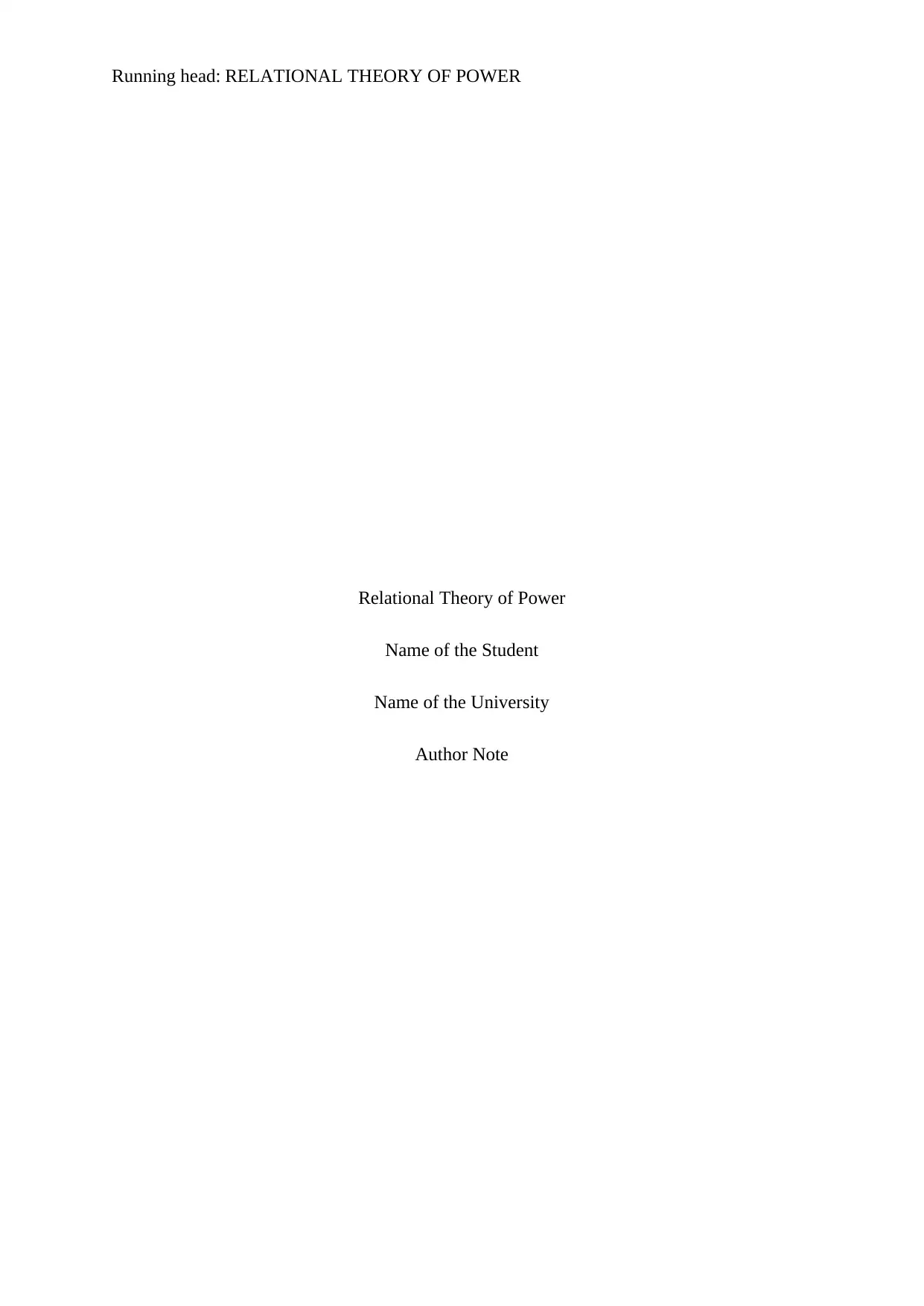
Running head: RELATIONAL THEORY OF POWER
Relational Theory of Power
Name of the Student
Name of the University
Author Note
Relational Theory of Power
Name of the Student
Name of the University
Author Note
Paraphrase This Document
Need a fresh take? Get an instant paraphrase of this document with our AI Paraphraser
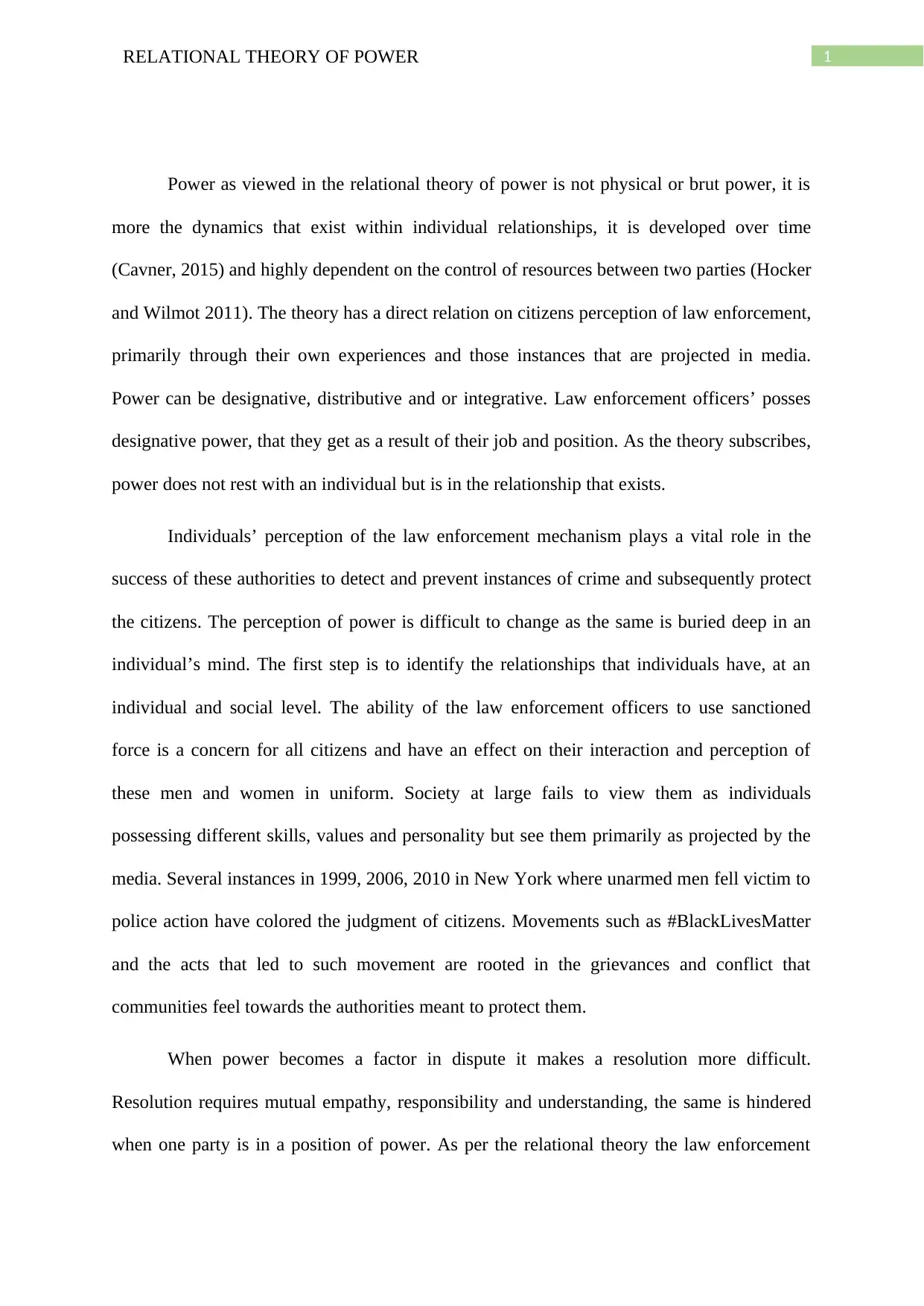
1RELATIONAL THEORY OF POWER
Power as viewed in the relational theory of power is not physical or brut power, it is
more the dynamics that exist within individual relationships, it is developed over time
(Cavner, 2015) and highly dependent on the control of resources between two parties (Hocker
and Wilmot 2011). The theory has a direct relation on citizens perception of law enforcement,
primarily through their own experiences and those instances that are projected in media.
Power can be designative, distributive and or integrative. Law enforcement officers’ posses
designative power, that they get as a result of their job and position. As the theory subscribes,
power does not rest with an individual but is in the relationship that exists.
Individuals’ perception of the law enforcement mechanism plays a vital role in the
success of these authorities to detect and prevent instances of crime and subsequently protect
the citizens. The perception of power is difficult to change as the same is buried deep in an
individual’s mind. The first step is to identify the relationships that individuals have, at an
individual and social level. The ability of the law enforcement officers to use sanctioned
force is a concern for all citizens and have an effect on their interaction and perception of
these men and women in uniform. Society at large fails to view them as individuals
possessing different skills, values and personality but see them primarily as projected by the
media. Several instances in 1999, 2006, 2010 in New York where unarmed men fell victim to
police action have colored the judgment of citizens. Movements such as #BlackLivesMatter
and the acts that led to such movement are rooted in the grievances and conflict that
communities feel towards the authorities meant to protect them.
When power becomes a factor in dispute it makes a resolution more difficult.
Resolution requires mutual empathy, responsibility and understanding, the same is hindered
when one party is in a position of power. As per the relational theory the law enforcement
Power as viewed in the relational theory of power is not physical or brut power, it is
more the dynamics that exist within individual relationships, it is developed over time
(Cavner, 2015) and highly dependent on the control of resources between two parties (Hocker
and Wilmot 2011). The theory has a direct relation on citizens perception of law enforcement,
primarily through their own experiences and those instances that are projected in media.
Power can be designative, distributive and or integrative. Law enforcement officers’ posses
designative power, that they get as a result of their job and position. As the theory subscribes,
power does not rest with an individual but is in the relationship that exists.
Individuals’ perception of the law enforcement mechanism plays a vital role in the
success of these authorities to detect and prevent instances of crime and subsequently protect
the citizens. The perception of power is difficult to change as the same is buried deep in an
individual’s mind. The first step is to identify the relationships that individuals have, at an
individual and social level. The ability of the law enforcement officers to use sanctioned
force is a concern for all citizens and have an effect on their interaction and perception of
these men and women in uniform. Society at large fails to view them as individuals
possessing different skills, values and personality but see them primarily as projected by the
media. Several instances in 1999, 2006, 2010 in New York where unarmed men fell victim to
police action have colored the judgment of citizens. Movements such as #BlackLivesMatter
and the acts that led to such movement are rooted in the grievances and conflict that
communities feel towards the authorities meant to protect them.
When power becomes a factor in dispute it makes a resolution more difficult.
Resolution requires mutual empathy, responsibility and understanding, the same is hindered
when one party is in a position of power. As per the relational theory the law enforcement
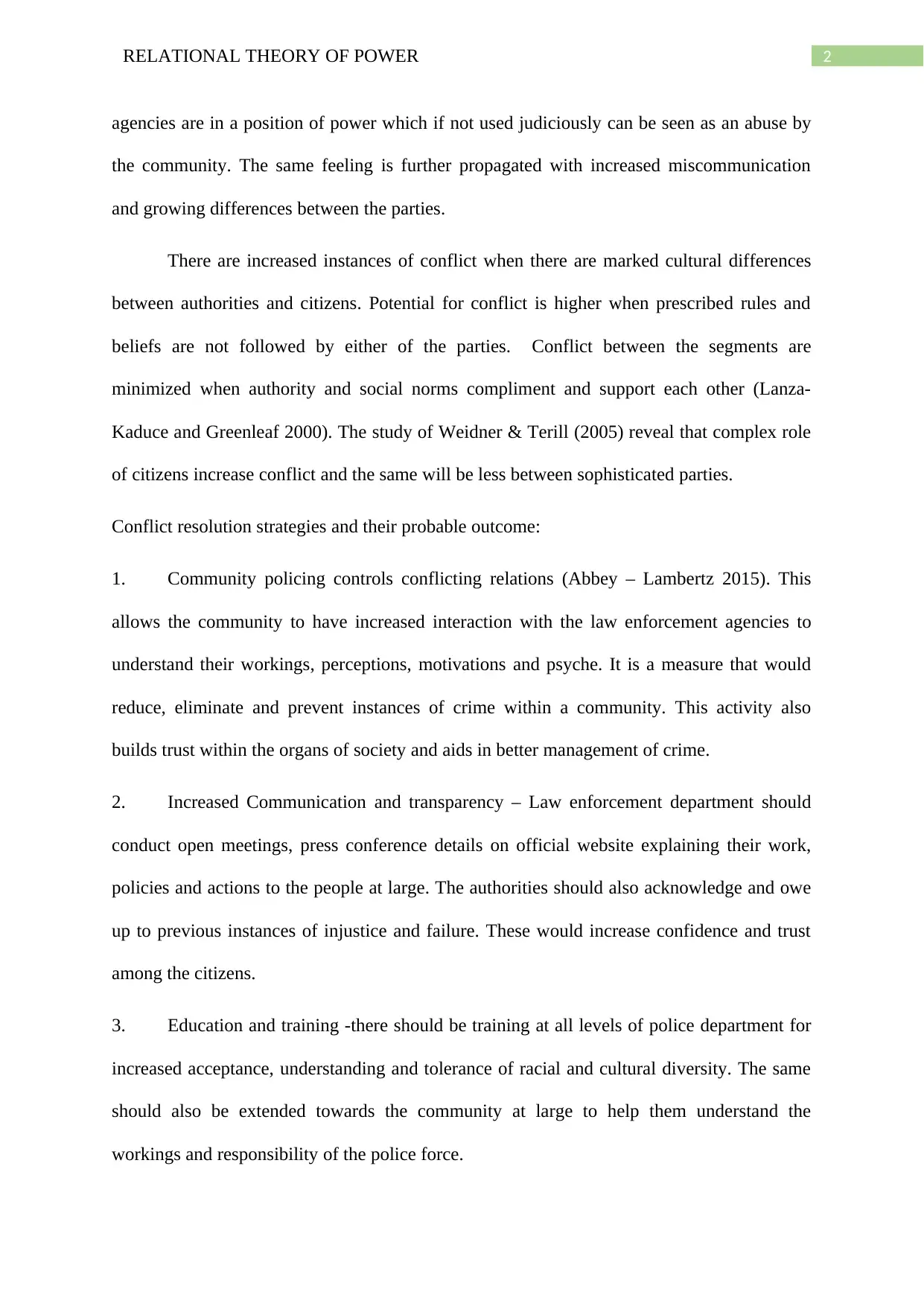
2RELATIONAL THEORY OF POWER
agencies are in a position of power which if not used judiciously can be seen as an abuse by
the community. The same feeling is further propagated with increased miscommunication
and growing differences between the parties.
There are increased instances of conflict when there are marked cultural differences
between authorities and citizens. Potential for conflict is higher when prescribed rules and
beliefs are not followed by either of the parties. Conflict between the segments are
minimized when authority and social norms compliment and support each other (Lanza-
Kaduce and Greenleaf 2000). The study of Weidner & Terill (2005) reveal that complex role
of citizens increase conflict and the same will be less between sophisticated parties.
Conflict resolution strategies and their probable outcome:
1. Community policing controls conflicting relations (Abbey – Lambertz 2015). This
allows the community to have increased interaction with the law enforcement agencies to
understand their workings, perceptions, motivations and psyche. It is a measure that would
reduce, eliminate and prevent instances of crime within a community. This activity also
builds trust within the organs of society and aids in better management of crime.
2. Increased Communication and transparency – Law enforcement department should
conduct open meetings, press conference details on official website explaining their work,
policies and actions to the people at large. The authorities should also acknowledge and owe
up to previous instances of injustice and failure. These would increase confidence and trust
among the citizens.
3. Education and training -there should be training at all levels of police department for
increased acceptance, understanding and tolerance of racial and cultural diversity. The same
should also be extended towards the community at large to help them understand the
workings and responsibility of the police force.
agencies are in a position of power which if not used judiciously can be seen as an abuse by
the community. The same feeling is further propagated with increased miscommunication
and growing differences between the parties.
There are increased instances of conflict when there are marked cultural differences
between authorities and citizens. Potential for conflict is higher when prescribed rules and
beliefs are not followed by either of the parties. Conflict between the segments are
minimized when authority and social norms compliment and support each other (Lanza-
Kaduce and Greenleaf 2000). The study of Weidner & Terill (2005) reveal that complex role
of citizens increase conflict and the same will be less between sophisticated parties.
Conflict resolution strategies and their probable outcome:
1. Community policing controls conflicting relations (Abbey – Lambertz 2015). This
allows the community to have increased interaction with the law enforcement agencies to
understand their workings, perceptions, motivations and psyche. It is a measure that would
reduce, eliminate and prevent instances of crime within a community. This activity also
builds trust within the organs of society and aids in better management of crime.
2. Increased Communication and transparency – Law enforcement department should
conduct open meetings, press conference details on official website explaining their work,
policies and actions to the people at large. The authorities should also acknowledge and owe
up to previous instances of injustice and failure. These would increase confidence and trust
among the citizens.
3. Education and training -there should be training at all levels of police department for
increased acceptance, understanding and tolerance of racial and cultural diversity. The same
should also be extended towards the community at large to help them understand the
workings and responsibility of the police force.
⊘ This is a preview!⊘
Do you want full access?
Subscribe today to unlock all pages.

Trusted by 1+ million students worldwide
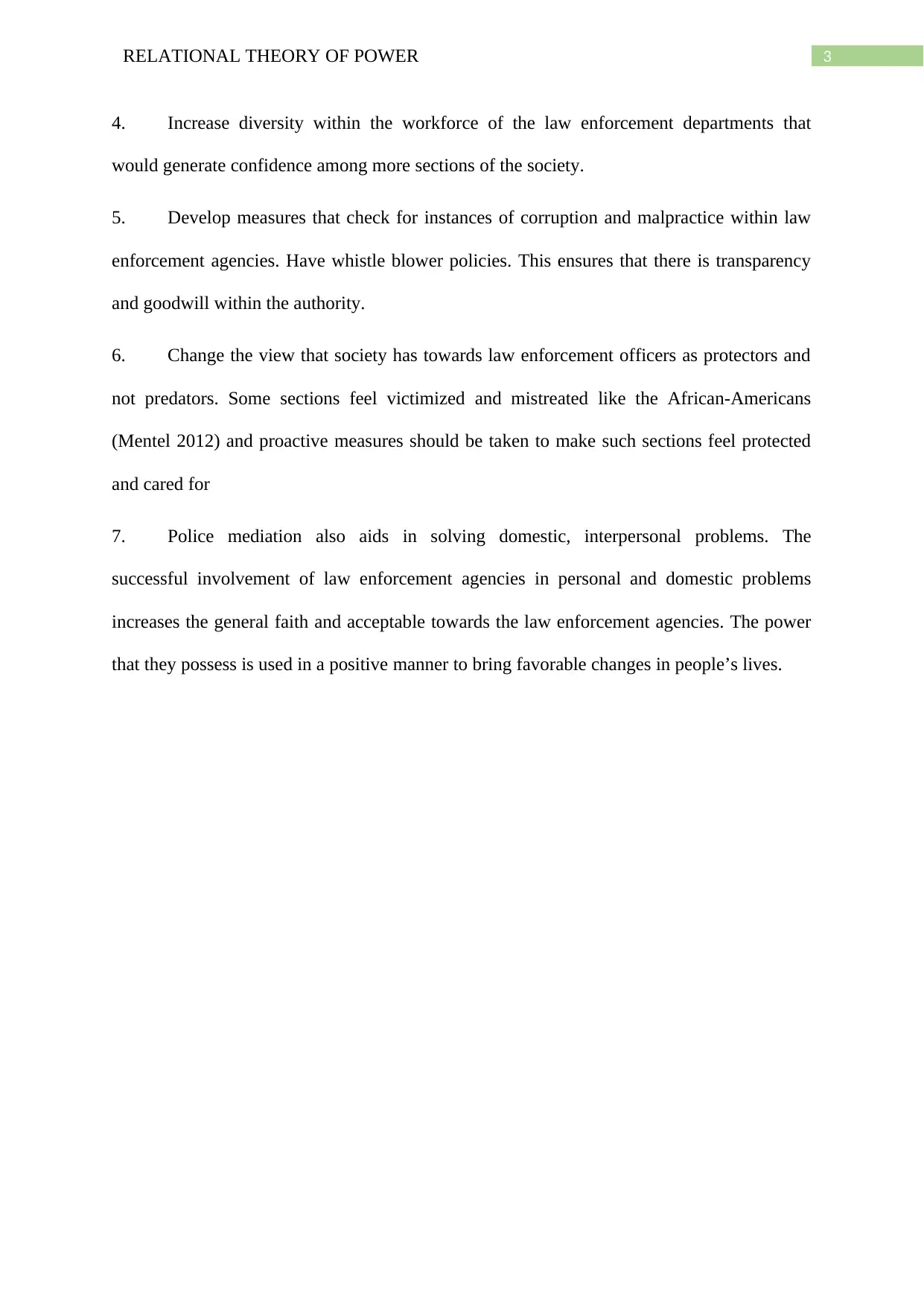
3RELATIONAL THEORY OF POWER
4. Increase diversity within the workforce of the law enforcement departments that
would generate confidence among more sections of the society.
5. Develop measures that check for instances of corruption and malpractice within law
enforcement agencies. Have whistle blower policies. This ensures that there is transparency
and goodwill within the authority.
6. Change the view that society has towards law enforcement officers as protectors and
not predators. Some sections feel victimized and mistreated like the African-Americans
(Mentel 2012) and proactive measures should be taken to make such sections feel protected
and cared for
7. Police mediation also aids in solving domestic, interpersonal problems. The
successful involvement of law enforcement agencies in personal and domestic problems
increases the general faith and acceptable towards the law enforcement agencies. The power
that they possess is used in a positive manner to bring favorable changes in people’s lives.
4. Increase diversity within the workforce of the law enforcement departments that
would generate confidence among more sections of the society.
5. Develop measures that check for instances of corruption and malpractice within law
enforcement agencies. Have whistle blower policies. This ensures that there is transparency
and goodwill within the authority.
6. Change the view that society has towards law enforcement officers as protectors and
not predators. Some sections feel victimized and mistreated like the African-Americans
(Mentel 2012) and proactive measures should be taken to make such sections feel protected
and cared for
7. Police mediation also aids in solving domestic, interpersonal problems. The
successful involvement of law enforcement agencies in personal and domestic problems
increases the general faith and acceptable towards the law enforcement agencies. The power
that they possess is used in a positive manner to bring favorable changes in people’s lives.
Paraphrase This Document
Need a fresh take? Get an instant paraphrase of this document with our AI Paraphraser
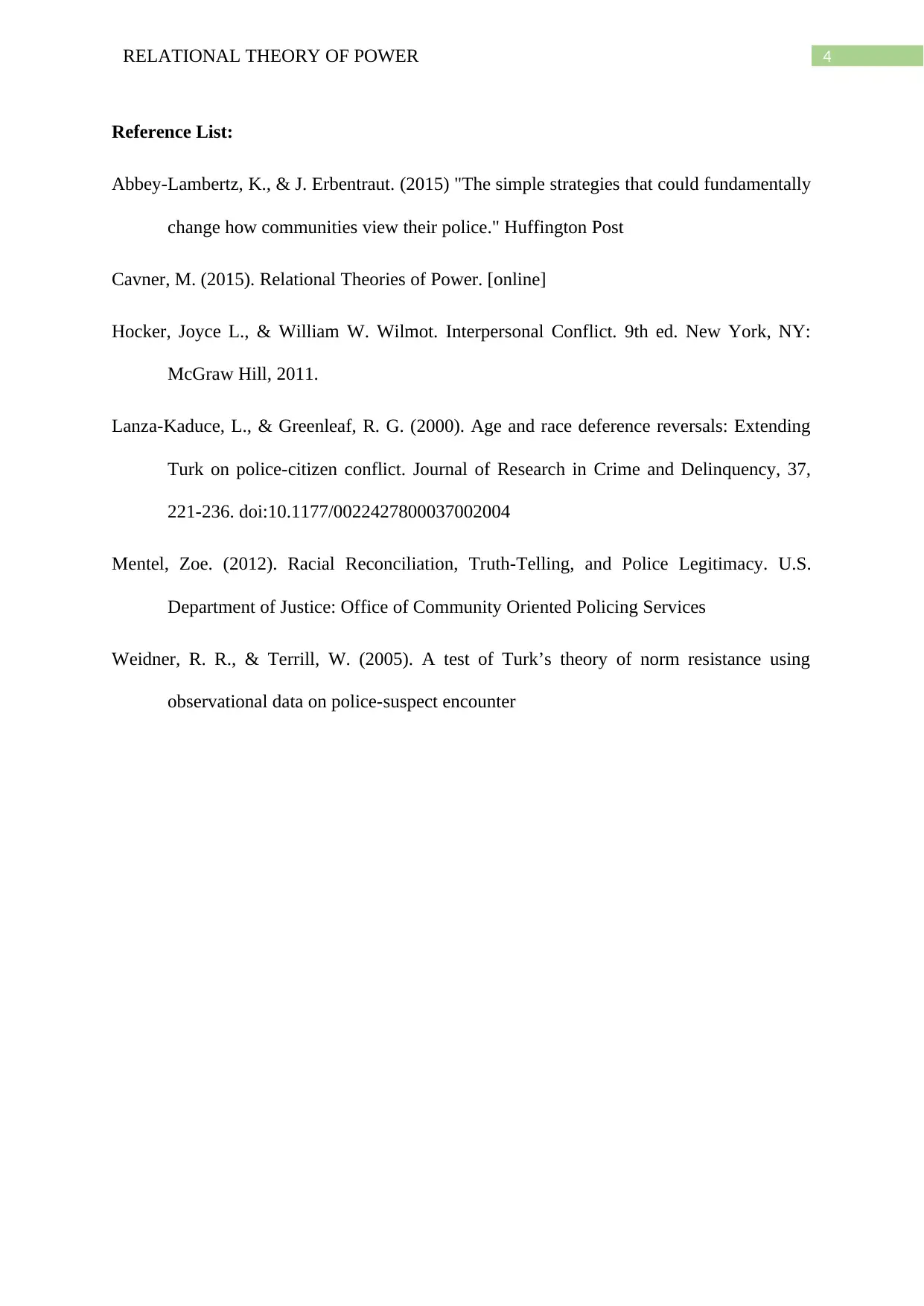
4RELATIONAL THEORY OF POWER
Reference List:
Abbey-Lambertz, K., & J. Erbentraut. (2015) "The simple strategies that could fundamentally
change how communities view their police." Huffington Post
Cavner, M. (2015). Relational Theories of Power. [online]
Hocker, Joyce L., & William W. Wilmot. Interpersonal Conflict. 9th ed. New York, NY:
McGraw Hill, 2011.
Lanza-Kaduce, L., & Greenleaf, R. G. (2000). Age and race deference reversals: Extending
Turk on police-citizen conflict. Journal of Research in Crime and Delinquency, 37,
221-236. doi:10.1177/0022427800037002004
Mentel, Zoe. (2012). Racial Reconciliation, Truth-Telling, and Police Legitimacy. U.S.
Department of Justice: Office of Community Oriented Policing Services
Weidner, R. R., & Terrill, W. (2005). A test of Turk’s theory of norm resistance using
observational data on police-suspect encounter
Reference List:
Abbey-Lambertz, K., & J. Erbentraut. (2015) "The simple strategies that could fundamentally
change how communities view their police." Huffington Post
Cavner, M. (2015). Relational Theories of Power. [online]
Hocker, Joyce L., & William W. Wilmot. Interpersonal Conflict. 9th ed. New York, NY:
McGraw Hill, 2011.
Lanza-Kaduce, L., & Greenleaf, R. G. (2000). Age and race deference reversals: Extending
Turk on police-citizen conflict. Journal of Research in Crime and Delinquency, 37,
221-236. doi:10.1177/0022427800037002004
Mentel, Zoe. (2012). Racial Reconciliation, Truth-Telling, and Police Legitimacy. U.S.
Department of Justice: Office of Community Oriented Policing Services
Weidner, R. R., & Terrill, W. (2005). A test of Turk’s theory of norm resistance using
observational data on police-suspect encounter
1 out of 5
Related Documents
Your All-in-One AI-Powered Toolkit for Academic Success.
+13062052269
info@desklib.com
Available 24*7 on WhatsApp / Email
![[object Object]](/_next/static/media/star-bottom.7253800d.svg)
Unlock your academic potential
Copyright © 2020–2026 A2Z Services. All Rights Reserved. Developed and managed by ZUCOL.





